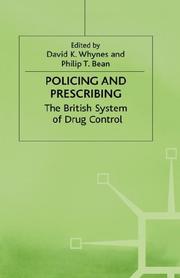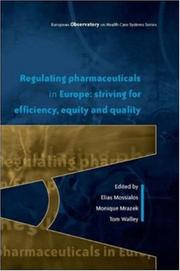| Listing 1 - 10 of 38 | << page >> |
Sort by
|
Book
ISBN: 9282700208 Year: 1995 Publisher: Luxembourg : Office for Official Publications of the European Communities,
Abstract | Keywords | Export | Availability | Bookmark
 Loading...
Loading...Choose an application
- Reference Manager
- EndNote
- RefWorks (Direct export to RefWorks)
Drugs --- Pharmaceutical policy --- Médicaments --- Law and legislation --- Droit --- Politique gouvernementale --- -Pharmaceutical policy --- -Drug policy --- Drugs and state --- Pharmacy --- Pharmacy and state --- State and drugs --- State and pharmacy --- Medical policy --- Medicaments --- Medications --- Medicine (Drugs) --- Medicines (Drugs) --- Pharmaceuticals --- Prescription drugs --- Bioactive compounds --- Medical supplies --- Pharmacopoeias --- Chemotherapy --- Materia medica --- Pharmacology --- -Government policy --- Government policy --- -Law and legislation --- -Drugs --- Médicaments --- Drug policy

Abstract | Keywords | Export | Availability | Bookmark
 Loading...
Loading...Choose an application
- Reference Manager
- EndNote
- RefWorks (Direct export to RefWorks)
Drug control --- Drug abuse --- -Pharmaceutical policy --- -Drug policy --- Drugs --- Drugs and state --- Pharmacy --- Pharmacy and state --- State and drugs --- State and pharmacy --- Medical policy --- Drug use --- Recreational drug use --- Substance abuse --- Great Britain --- -Prevention --- Government policy --- Pharmaceutical policy --- Prevention. --- -Great Britain --- Drug policy --- Great Britain&delete& --- Prevention
Multi
ISBN: 0855980656 9780855980658 Year: 1982 Publisher: Oxford Oxfam
Abstract | Keywords | Export | Availability | Bookmark
 Loading...
Loading...Choose an application
- Reference Manager
- EndNote
- RefWorks (Direct export to RefWorks)
Pharmaceutical policy --- Pharmaceutical industry --- Drug policy --- Drugs --- Drugs and state --- Pharmacy --- Pharmacy and state --- State and drugs --- State and pharmacy --- Medical policy --- Drug industry --- Drug trade --- Medicine industry --- Medicines industry --- Prescription medicine industry --- Chemical industry --- Government policy --- Pharmaceutical policy - Developing countries --- Pharmaceutical industry - Developing countries
Book
ISBN: 1283292629 9786613292629 0821387715 082138760X Year: 2011 Publisher: Washington, D.C. : World Bank,
Abstract | Keywords | Export | Availability | Bookmark
 Loading...
Loading...Choose an application
- Reference Manager
- EndNote
- RefWorks (Direct export to RefWorks)
This book applies an established analytical framework for health sector reform (Getting Health Reform Right, Oxford, 2004) to the performance problems of the pharmaceutical sector. The book is divided into three sections. The first section presents the basic ideas for analysis. It begins by insisting that reform start with a clear understanding of the performance deficiencies of the current system. Like all priority setting in the public sector, this 'definition of the problem' involves both ethical choices and political processes. Early chapters explain the foundations of these ideas and appl
Pharmaceutical policy. --- Pharmaceutical industry. --- Health care reform. --- Health reform --- Health system reform --- Healthcare reform --- Medical care reform --- Reform of health care delivery --- Reform of medical care delivery --- Drug industry --- Drug trade --- Drug policy --- Drugs --- Drugs and state --- Pharmacy --- Pharmacy and state --- State and drugs --- State and pharmacy --- Government policy --- Medical policy --- Health insurance --- Medicine industry --- Medicines industry --- Prescription medicine industry --- Chemical industry

ISBN: 1849642710 0745324037 9780745324036 0745324029 9780745324029 9781849642712 Year: 2006 Publisher: London Ann Arbor, MI Pluto
Abstract | Keywords | Export | Availability | Bookmark
 Loading...
Loading...Choose an application
- Reference Manager
- EndNote
- RefWorks (Direct export to RefWorks)
A textbook on global pharmaceutical policies.
Pharmaceutical policy. --- Pharmaceutical industry --- Drug development. --- Moral and ethical aspects. --- Development of drugs --- Drugs --- New drug development --- Drug industry --- Drug trade --- Drug policy --- Drugs and state --- Pharmacy --- Pharmacy and state --- State and drugs --- State and pharmacy --- Development --- Government policy --- Pharmacology --- Medicine industry --- Medicines industry --- Prescription medicine industry --- Chemical industry --- Medical policy
Book
ISBN: 0191756288 0191664650 0191664669 9780191664656 9780191756283 9780199676743 0199676747 Year: 2014 Publisher: Oxford
Abstract | Keywords | Export | Availability | Bookmark
 Loading...
Loading...Choose an application
- Reference Manager
- EndNote
- RefWorks (Direct export to RefWorks)
This title examines the tension between intellectual property law and access to medicine in a set of developing countries caught between their international trade obligations and their commitment to the health of their citizens.
Pharmaceutical policy --- Drug accessibility --- Drugs --- Conflict of laws --- Intellectual property --- Choice of law --- Intermunicipal law --- International law, Private --- International private law --- Private international law --- Law --- Legal polycentricity --- Access to drugs --- Accessibility of drugs --- Availability of drugs --- Drug availability --- Drug policy --- Drugs and state --- Pharmacy --- Pharmacy and state --- State and drugs --- State and pharmacy --- Medical policy --- Civil law --- Government policy

ISBN: 1280947357 9786610947355 0335226558 9780335226559 9780335214655 0335214657 9780335214662 0335214665 9781280947353 0335214657 0335214665 661094735X Year: 2004 Publisher: Buckingham ; Maidenhead, Berkshire Brussels Open University Press European Observatory on Health Systems and Policies
Abstract | Keywords | Export | Availability | Bookmark
 Loading...
Loading...Choose an application
- Reference Manager
- EndNote
- RefWorks (Direct export to RefWorks)
The rising cost of pharmaceutical expenditures in many European countries is of concern to governments required to make effective use of health care budgetsTaking a broad perspective that encompasses institutional, political and supranational aspects of pharmaceutical regulation, this book examines approaches used to manage pharmaceutical expenditure across Europe and what impact these strategies have had on the efficiency, quality, equity and cost of pharmaceutical care.Regulating Pharmaceuticals in Europe is an important book for students of health policy, regulation and management, and for health managers and policy makers.
Pharmaceutical industry --- Drugs --- Pharmaceutical policy --- Drug policy --- Drugs and state --- Pharmacy --- Pharmacy and state --- State and drugs --- State and pharmacy --- Medical policy --- Medicaments --- Medications --- Medicine (Drugs) --- Medicines (Drugs) --- Pharmaceuticals --- Prescription drugs --- Bioactive compounds --- Medical supplies --- Pharmacopoeias --- Chemotherapy --- Materia medica --- Pharmacology --- Law and legislation --- Prescribing --- Government policy --- HG 9391 Pharmaceutical Services Insurance (General Works) --- legislation and jurisprudence --- Legislation, Drug --- Europe --- Drug and Narcotic Control
Book
ISBN: 1299443346 1609947908 9781609947903 9781609947910 1609947916 9781609947897 1609947894 Year: 2013 Publisher: San Francisco Berrett-Koehler Publishers
Abstract | Keywords | Export | Availability | Bookmark
 Loading...
Loading...Choose an application
- Reference Manager
- EndNote
- RefWorks (Direct export to RefWorks)
Every four minutes, over 50 children under the age of five die. In the same four minutes, 2 mothers lose their lives in childbirth. Every year, malaria kills nearly 1.2 million people, despite the fact that it can be prevented with a mosquito net and treated for less than 1.50.Sadly, this list goes on and on. Millions are dying from diseases that we can easily and inexpensively prevent, diagnose, and treat. Why? Because even though we know exactly what people need, we just can't get it to them. They are dying not because we can't solve a medical problem but because we can't solve a logistics
Pharmaceutical policy --- Drugs --- Medical care --- World health. --- Global health --- International health --- Public health --- Medical geography --- Medicaments --- Medications --- Medicine (Drugs) --- Medicines (Drugs) --- Pharmaceuticals --- Prescription drugs --- Bioactive compounds --- Medical supplies --- Pharmacopoeias --- Chemotherapy --- Materia medica --- Pharmacology --- Pharmacy --- Drug policy --- Drugs and state --- Pharmacy and state --- State and drugs --- State and pharmacy --- Medical policy --- International cooperation --- Government policy --- World health --- E-books
Book
ISBN: 9781634631532 1634631536 1634631226 9781634631228 Year: 2014 Publisher: New York
Abstract | Keywords | Export | Availability | Bookmark
 Loading...
Loading...Choose an application
- Reference Manager
- EndNote
- RefWorks (Direct export to RefWorks)
The Medicare Prescription Drug, Improvement, and Modernization Act of 2003 (generally referred to as the Medicare Modernization Act, or MMA) substantially expanded the federal Medicare program by creating the prescription drug benefit known as Part D. In fiscal year 2013, Medicare Part D covered 39 million people. The federal government spent 59 billion net of premiums on Part D in that year; after accounting for certain payments from states under the program, the net federal cost was 50 billion, which represented 10 percent of net federal spending for Medicare. This book discusses the cost tr
Medicare --- Pharmaceutical services insurance --- Medical care, Cost of --- Health insurance --- Older people --- Medicaid --- Medigap --- Medical care --- E-books --- Medicare. --- Pharmaceutical policy. --- Drug policy --- Drugs --- Drugs and state --- Pharmacy --- Pharmacy and state --- State and drugs --- State and pharmacy --- Medical policy --- Drug benefit plans --- Drug insurance --- Insurance, Pharmaceutical services --- Pharmaceutical insurance --- Prepaid prescription drug plans --- Prescription drug insurance --- Prescription drug programs --- Insurance --- Government policy
Book
ISBN: 0511850212 1107203201 1282723324 9786612723322 0511749295 0511743491 0511750048 0511742428 0511750781 0511744587 0521116562 1107693454 Year: 2010 Publisher: Cambridge : Cambridge University Press,
Abstract | Keywords | Export | Availability | Bookmark
 Loading...
Loading...Choose an application
- Reference Manager
- EndNote
- RefWorks (Direct export to RefWorks)
This portrait of the global debate over patent law and access to essential medicines focuses on public health concerns about HIV/AIDS, malaria, tuberculosis, the SARS virus, influenza, and diseases of poverty. The essays explore the diplomatic negotiations and disputes in key international fora, such as the World Trade Organization, the World Health Organization and the World Intellectual Property Organization. Drawing upon international trade law, innovation policy, intellectual property law, health law, human rights and philosophy, the authors seek to canvass policy solutions which encourage and reward worthwhile pharmaceutical innovation while ensuring affordable access to advanced medicines. A number of creative policy options are critically assessed, including the development of a Health Impact Fund, prizes for medical innovation, the use of patent pools, open-source drug development and forms of 'creative capitalism'.
Pharmaceutical policy. --- Patent laws and legislation. --- Drugs --- Patents (International law) --- Drug policy --- Drugs and state --- Pharmacy --- Pharmacy and state --- State and drugs --- State and pharmacy --- Medical policy --- Patent laws and legislation (International law) --- International law --- Law, Patent --- Patents --- Scientific property --- Industrial laws and legislation --- Industrial property --- Trade regulation --- Copyright --- Government policy --- Law and legislation --- Patents. --- Law --- General and Others
| Listing 1 - 10 of 38 | << page >> |
Sort by
|

 Search
Search Feedback
Feedback About UniCat
About UniCat  Help
Help News
News